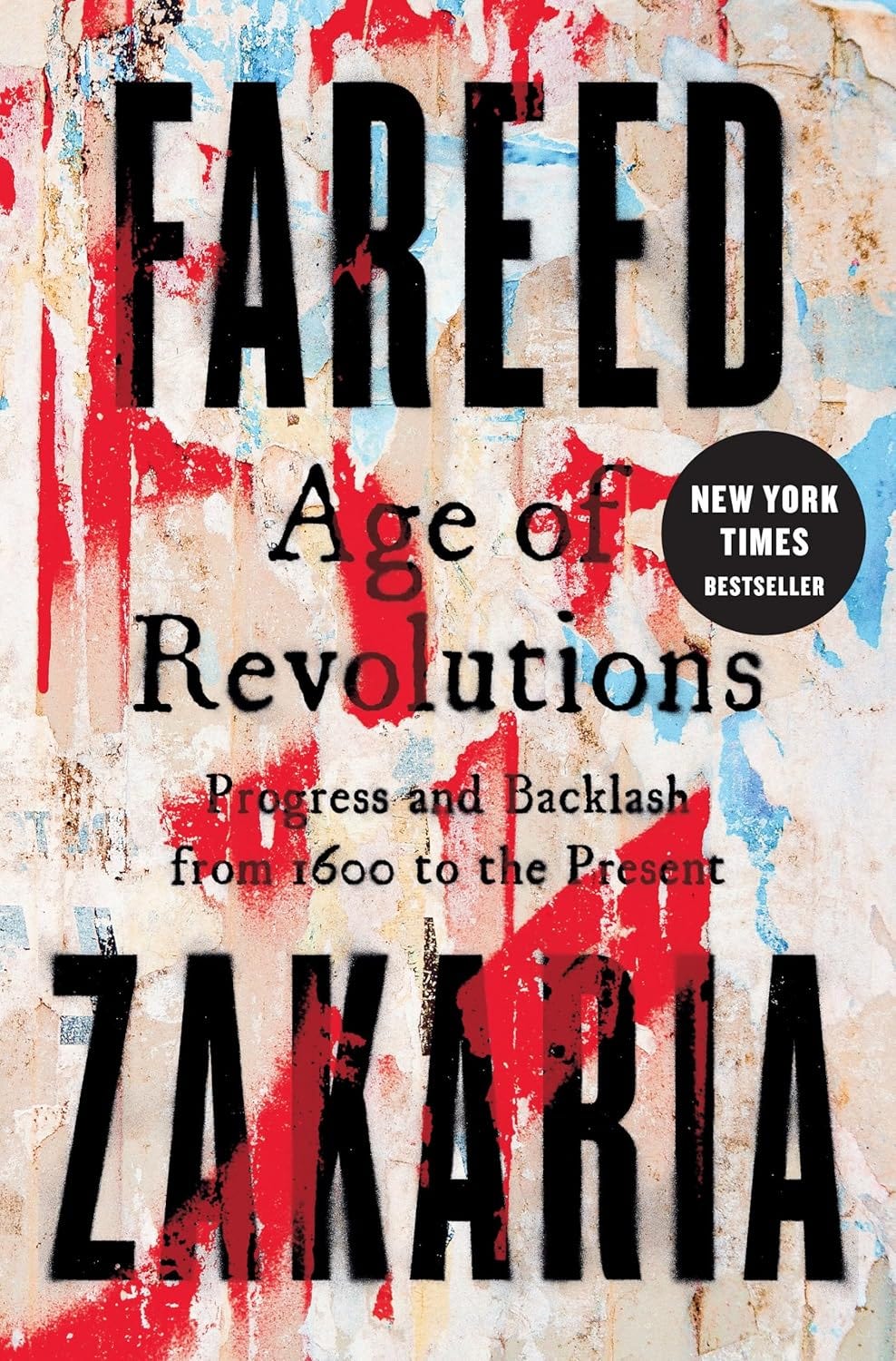Tl;dr – A great read on the last few hundred years of revolutions to set the context to understand the modern shifts and populist revolutions we’re now witness to. Not totally unique arguments, but a wonderful summative collection of the impact of globalization, identity politics, and rapid technological advancements on what may come to be the most impactful global revolution of our time.
As we sit on what could be the brink of WWIII, many of us are wondering “how the hell did we get here?” And it’s not just here as in the US (where most of my readers are based), but it’s kind of everywhere. Populism (and other authoritarian governments) has been sweeping the globe in the past decade. But why? And what comes next?
In Age of Revolutions: Progress and Backlash from 1600 to the Present, Fareed Zakaria documents revolutions of the past that set the stage for the revolutions of the present. It’s a highly detailed and informative work. I honestly missed this book when it came out and only read it because it was the selected book for a book club I joined (I found and in-person nonfiction book club!). I’m happy I read it, and I learned a lot.
The crux of the book as I read it is that the populist revolutions we’re witness to is a pendulum swing of sorts from the long project of liberalism that started by the Dutch in the 1600s. The current state is defined by rapid technological change, the rise of identity politics (and the individual over community), an ongoing shift in global power (the “rise of the rest” and decline of the US), and a backlash toward globalism in favor of nationalism. These modern changes have set the stage for illiberalism.
Why? Because, paradoxically, the freedoms provided by and foundational to liberalism created the perfect conditions for people to reject the necessity of those freedoms. I see this is similar to the case of anti-vaxxers (in part) not seeing the point or value in vaccines because vaccines have been so effective in minimizing disease that they don’t see how indispensable they are to their health.
The rejection of liberal ideals – by the right especially but also by the left – such as free speech, is deeply concerning. Our expansive freedoms have, as he explains, come at the expense of authority and tradition. This makes many uneasy having to define their own purpose and path in life. Populists, with their deep roots in God, has led to people finding comfort in the something to believe in, rather than dealing with the anxiety that we made this whole world up, there is no inherent point, and you have to make of your life what you will. It’s easier to cozy up to a predestined narrative than make your own.
The greatest community project – liberalism – is at threat of extinction for the foreseeable future. It's a frightening time.
I don’t think the arguments of Zakaria are necessarily highly original per se, but I think the book is a wonderful collection of these arguments set it an enlightening historical context. One part I did find particularly insightful was his analysis of the US in a downfall state as the global power. We are on the decline. I’ve seen others write about this too, that basically we peaked in the 1990s or so and, especially after 9/11, began declining in a global context ever since. The rapid rise of China, the return of Russia, all pose major shift in the global order.
Will we course correct and defend liberalism? Honestly, it feels like a 50/50 shot at this point.
Reader poll
Published: March 2024
Publisher: W. W. Norton & Company
Format: Hardcover
If you think this sounds interesting, bookmark these other great reads:
On Tyranny: Twenty Lessons from the Twentieth Century (2017) by Timothy Snyder | Read my review
Suicide of the West: How the Rebirth of Tribalism, Populism, Nationalism, and Identity Politics Is Destroying American Democracy (2018) by Jonah Goldberg
Mortal Republic: How Rome Fell into Tyranny (2018) by Edward Watts
You might also like…
A Book Guide to the Histories of Great Ideas
Great ideas are what make us human. While we’re often on the receiving end of these great ideas, less often do we take the time to learn how great ideas came to be. The thinkers braving new intellectual ground, the experimentation, the dreams – the mistakes – that culminate in changing the course of history. This month, I’ve put together a collection of…







